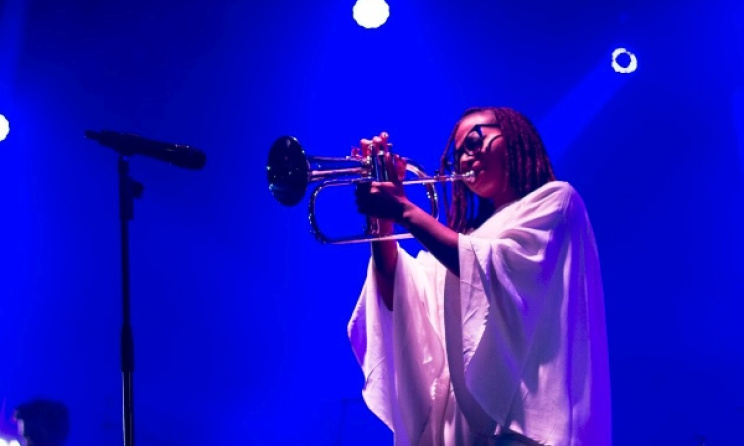Asa demands worship at Encore concert
The first few performers at the Asa Encore concert were said to be handpicked by the artist herself.
 Asa plays the trumpet. Photo: AsaEncore
Asa plays the trumpet. Photo: AsaEncore
Tay Iwar, Funbi, Lindsey Abudei, Aramide—all artists with a bit of a cult following; all talented. Together they served as the forerunners for the night's main act.
"We are recording this," declared media personality Olisa Adibua, the night's compere. "It is a special."
It was special alright. Asa was returning after last year's acclaimed concert, which was hardly the first time she was performing in Lagos but certainly the biggest of her shows. The last of the opening acts was Omolara, songwriter for Timi Dakolo, Praiz and Asa herself. Like the other artists on the night, Omolara performed music without much of a future in the average Nigerian club. As with the others, the audience applauded her, all the while waiting for Asa.
When Asa did make an entrance, she was clad in white, a rather divine sight. When she spread her arms out, she became an angel extempore. Since her self-titled debut album came out, Asa has commanded a following that waits for her music.
At the Eko Hotel venue, the fans sang along, swaying and singing right from the opener 'Awe'. The song, a story of a wayward liaison between a man and an older woman, set the mood for the evening, which proceeded with story, song and 'the Asa dance', a peculiar thing of nimble feet and wilfully flailing arms.
In true Nigerian style, the lady christened Bukola Elemide offered inspiration through her own story. Years ago in Paris she waited for hours to be auditioned. Hungry and tired she was finally asked to perform by someone who seemed to remember there was one more 'wannabe' waiting. She picked up her guitar, performed and months later got a record deal. The implicit lesson was patience. The practical aspect of the story was an apology for her lateness, though with a chortle she said she's always on time, save for this one event.
Not that her audience cared. They rivalled her singing in wave after wave of echoes. That is, except for a brief period when she stopped singing and asked the audience to complete the hook to 'Eyo', a song from 2014's Bed of Stone, her last studio album. There was irony—Eyo' is a song about Lagos to which Lagosians do not know the words:
Eyo o, eyo o
Eyo o, eyo o
Where the children run around
There's laughing in the crowd
I hope it still remains the same
Eyo o, eyo o
Eyo o, eyo o
And there's something in the song
That makes you feel at home
And that's what's calling out my name
The songs changed as did her outfits. From the angelic white to a clingy black number. The show's production was exquisite, the much publicised Vesta Violins Ensemble/Chamber Orchestra, a 30-man accompaniment led by a Caucasian conductor, working seamlessly with the star who played guitar and trumpet at different times. One of the instrumentalists later became the object of Asa's affection.
"Do you have a girlfriend," she asked.
Smart man, he smiled.
"Tell her, it's Asa," she continued.
Many in the audience laughed, perhaps in agreement that if there is one woman who can get away with being the other woman, it should be Asa.
Although regarded as different, and indeed superior to most of her performing artist colleagues, Asa praised the lot of them, saying Nigerian music has travelled around the world. She added a caveat: some take the source country of the sound as Niger not Nigeria, relaying an experience with a Davido-loving Uber driver in Europe.
"I like Davido from Niger," he told her.
"If Davido hears you," she said, "he will get his father and kick your ass."
At some point in the evening, Asa came off stage, hugging and thanking members of the audience, some of whom took the opportunity to embrace and dance with the diminutive star.
For other artists, coming to the audience in a swanky venue like the Eko Hotel hall asserts their humanity. It screams "Touch me, I too am human!". For Asa it's different. The impressive production of the concert, the excellence of her singing and the songs, always the songs—all these place her a cut above mere humanity even when she's beheld or held.
The Eko Hotel venue was mostly a cathedral, the audience was essentially a congregation, and throughout Asa herself, though human, performed like a deity, one deserving of worship.

































Comments
Log in or register to post comments